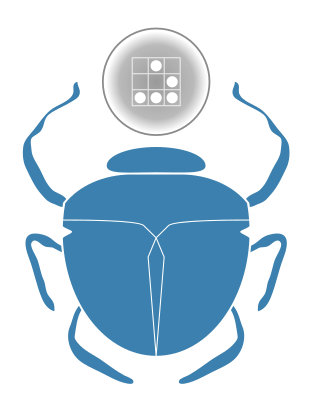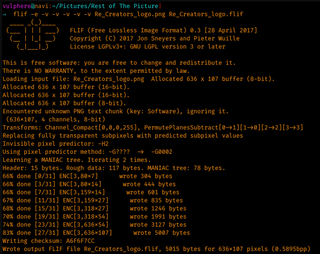
Bash, short for Bourne-Again SHell, is a shell program and command language supported by the Free Software Foundation and first developed for the GNU Project by Brian Fox. Designed as a 100% free software alternative for the Bourne shell, it was initially released in 1989. Its moniker is a play on words, referencing both its predecessor, the Bourne shell, and the concept of rebirth.

GNU Image Manipulation Program, commonly known by its acronym GIMP, is a free and open-source raster graphics editor used for image manipulation (retouching) and image editing, free-form drawing, transcoding between different image file formats, and more specialized tasks. It is extensible by means of plugins, and scriptable. It is not designed to be used for drawing, though some artists and creators have used it in this way.
Multiple-image Network Graphics (MNG) is a graphics file format published in 2001 for animated images. Its specification is publicly documented and there are free software reference implementations available.

Portable Network Graphics is a raster-graphics file format that supports lossless data compression. PNG was developed as an improved, non-patented replacement for Graphics Interchange Format (GIF)—unofficially, the initials PNG stood for the recursive acronym "PNG's not GIF".

Ghostscript is a suite of software based on an interpreter for Adobe Systems' PostScript and Portable Document Format (PDF) page description languages. Its main purposes are the rasterization or rendering of such page description language files, for the display or printing of document pages, and the conversion between PostScript and PDF files.
Animated Portable Network Graphics (APNG) is a file format which extends the Portable Network Graphics (PNG) specification to permit animated images that work similarly to animated GIF files, while supporting 24 or 48-bit images and full alpha transparency not available for GIFs. It also retains backward compatibility with non-animated PNG files.

IrfanView is an image viewer, editor, organiser and converter program for Microsoft Windows. It can also play video and audio files, and has some image creation and painting capabilities. IrfanView is free for non-commercial use; commercial use requires paid registration. It is noted for its small size, speed, ease of use, and ability to handle a wide variety of graphic file formats. It was first released in 1996.

Cairo is an open-source graphics library that provides a vector graphics-based, device-independent API for software developers. It provides primitives for two-dimensional drawing across a number of different backends. Cairo uses hardware acceleration when available.
pkg-config is a computer program that defines and supports a unified interface for querying installed libraries for the purpose of compiling software that depends on them. It allows programmers and installation scripts to work without explicit knowledge of detailed library path information. pkg-config was originally designed for Linux, but it is now also available for BSD, Microsoft Windows, macOS, and Solaris.
Python Imaging Library is a free and open-source additional library for the Python programming language that adds support for opening, manipulating, and saving many different image file formats. It is available for Windows, Mac OS X and Linux. The latest version of PIL is 1.1.7, was released in September 2009 and supports Python 1.5.2–2.7.

Audacious is a free and open-source audio player software with a focus on low resource use, high audio quality, and support for a wide range of audio formats. It is designed primarily for use on POSIX-compatible Unix-like operating systems, with limited support for Microsoft Windows. Audacious was the default audio player in Ubuntu Studio in 2011–12, and was the default music player in Lubuntu until October 2018, when it was replaced with VLC.

Seashore is a free and open-source image editor for macOS, similar to Photoshop/GIMP, with a simpler Cocoa user interface. Seashore uses GIMP's native file format, XCF, and has support for a handful of other graphics file formats, including full support for TIFF, PNG, JPEG, JPEG2000, and HEIC and read-only support for BMP, PDF, SVG and GIF. Seashore offers fewer features than Photoshop/GIMP, but is intended to be easy-to-use and to run natively on macOS. It includes layers, alpha channel support, gradients and transparency effects, anti-aliased brushes, tablet support and plug-in filters.
Axialis IconWorkshop is an icon editor developed by Axialis Software. IconWorkshop can create icons for Windows (.ico), Macintosh (.icns) and UNIX-like systems (.png). IconWorkshop includes a library of objects that can be put together to create many different styles of icons. The utility supports plugins and allows importing graphics directly from Photoshop and Illustrator.

Zotero is free and open-source reference management software to manage bibliographic data and related research materials, such as PDF and ePUB files. Features include web browser integration, online syncing, generation of in-text citations, footnotes, and bibliographies, integrated PDF, ePUB and HTML readers with annotation capabilities, and a note editor, as well as integration with the word processors Microsoft Word, LibreOffice Writer, and Google Docs. It was originally created at the Center for History and New Media at George Mason University and, as of 2021, is developed by the non-profit Corporation for Digital Scholarship.

librsvg, is a free software SVG rendering library written as part of the GNOME project, intended to be lightweight and portable. The Linux command-line program rsvg-convert uses the library to turn SVG files into raster images.

PhotoLine is a general purpose bitmap and vector graphics editor developed and published by Computerinsel GmbH for Windows, macOS, and Linux/Wine. It was originally created in 1995 by Gerhard Huber and Martin Huber. The program combines bitmap and vector graphics editing in one seamless working application unlike most graphics software which tend to focus on either bitmap or vector editing and output. PhotoLine is considered as a market competitor to Adobe Photoshop.
WebP is a raster graphics file format developed by Google intended as a replacement for JPEG, PNG, and GIF file formats. It supports both lossy and lossless compression, as well as animation and alpha transparency.

Free Lossless Image Format (FLIF) is a lossless image format claiming to outperform PNG, lossless WebP, lossless BPG and lossless JPEG 2000 in terms of compression ratio on a variety of inputs.
LÖVE is a free, open-source, cross-platform framework released under the zlib license for developing video games. The framework is written in C++ and uses Lua as its scripting language and is still maintained by its original developers. The framework is cross-platform supporting the platforms Microsoft Windows, macOS, Linux, Android, and iOS.







